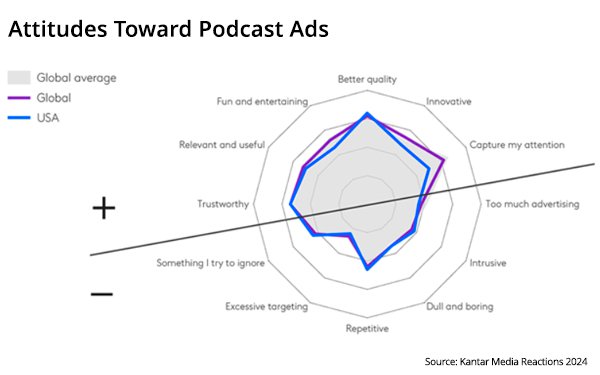
For years, podcasts have built audiences for
a variety of reasons, but advertisers say there is something missing in the automated ad-buying process.
“It really comes down to getting digital audio podcast inventory into
media-planning tools with a nomenclature that buyers understand so they can properly forecast and place campaigns within their goals and KPIs,” said Rockie Thomas, chief officer at Soundstack,
an audio-as-a-service company.
Thomas, who loves audio “for all its incredible creators," said the industry needs to focus more on efforts to easily buy media.
There also are
other challenges when it comes to participating in typical programmatic channels. For example, supply-path optimization (SPO) and ads.txt adoption that are similar to what connected television (CTV)
is experiencing, she said.
advertisement
advertisement
Brian Morrissey, the founder of The Rebooting, wrote in a newsletter that “coming off what was billed as the podcast election, I expect
we’ll see another round of talk that podcasting has truly arrived.”
He estimates active podcast listeners will grow from 117 million Americans today to 135 million
in 2028, and that ad spending will grow from $2.4 billion in 2024 to $3.1 billion in 2028.
Activate Consulting’s data, which Morrissey cites, shows a “market that operates with an
extreme power law: Of the 4.2 million podcasts, the top 25 podcasts account for half of listening.”
There is no shortage of podcasts, with video growing as another option
for listeners and advertisers. Other data shows that as many as 33% of U.S. podcast listeners opt into video on sites like YouTube, Spotify, and Apple.
There are an estimated 546
million podcast listeners worldwide.
In 2024, worldwide podcast ad spending is estimated to reach $4.02 billion. By 2027, the number of podcast listeners worldwide is forecast to reach 651.7 million.
Jeffrey Wlodarczak, CEO and internet, media, sports and communications analyst at Pivotal Research Group,
published a research note Tuesday highlighting Spotify when it reported “overall very strong” Q3 2024 results and Q4 guidance.
Results were highlighted by better-than-expected net
new premium monthly active users of more than 6 million -- compared to the analyst’s firm consensus of more than 5 million -- despite a 7% decline in marketing spend.
Consumers'
attitudes toward podcasts are changing. They are viewed as being more trustworthy and authentic, and as having more diverse ad formats with integration into other media such as social media. This
creates a more multichannel campaign, more targeting capabilities.
In addition, live podcasting offers the ability for advertisers to engage in real-time.
For all these
reasons, publishers and platforms are investing in talent as brands plan to increase how much of it is spent.
Kantar estimates
41% of marketers globally plan to increase spending on podcast advertising in 2025. The effectiveness of these podcasts has been called into question.
Kantar notes that in the past few
years, the industry has seen the rise of podcaster personalities who command "big bucks" such as Travis and Jason Kelce, who signed a $100 million deal with Amazon for their "New Heights" podcast.
Joe Rogan has a rumored $250 million deal with Spotify. Alexandra Cooper’s "Call Her Daddy" podcast, recently signed to SiriusXM for $125 million, is the podcast most listened to by women in
the U.S., which is why U.S. Vice President Kamala Harris likely agreed to the interview before the election.
Not
all podcasters want ads. Barbara DeMarco-Barrett -- a writer who produces the podcast "Writers on Writing" -- began on the radio in 1998 and started producing a podcast in 2005. When the COVID
pandemic struck, the station closed and hosts began producing the shows from home, sending files to the station to broadcast.
When the station allowed DJs and talk show hosts to come back more
than a year later, the group found they continued to do an effective job broadcasting from home. “Listeners who value the show became patrons and continue to join, DeMarco-Barrett said, adding
that the "Writers on Writing" podcast is free.
“The audience gains knowledge from notable authors and literary agents,” she said, adding
that this is all done without ads. “They gain inspiration. Then gain connection with writers and don’t feel so alone on the writing path.”
When she listens to podcasts that have sponsors, DeMarco-Barrett fast-forwards through the commercials.
“As long as we can, we won’t have advertisers on ours,” she said. Hopefully our patrons on Patreon will continue to grow.”